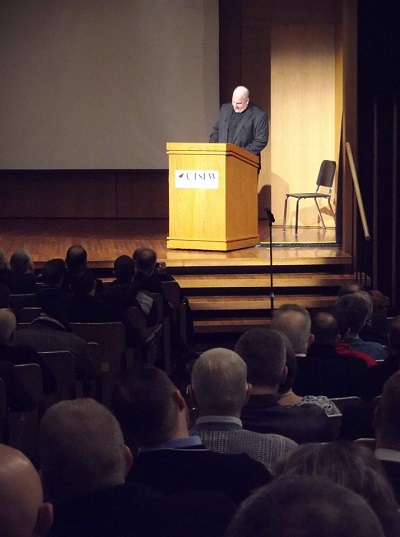Dr. Peter Scaer, CTSFW Professor and Chairman of Exegetical Theology

Christ was born under the law to redeem those under the law. You were bought with a price, ransomed with the blood of Christ. Without the shedding of blood, there is no forgiveness. Sin is a debt. It cannot be erased. Someone must foot the bill. “Do not think that I have come to abolish the Law or the Prophets; I have not come to abolish them but to fulfill them” (Matt. 5:17).
In loving and obeying His Father perfectly and denying the desires of the flesh, Jesus fulfills the first and second tables of the Law. He came to serve, not to be served. Our Lord had to drink the cup of suffering. The message to the nations becomes the Father’s message to the Son: you must drink. The chief priests were right: he could save others but not himself. There was no other way.
You can see examples of this fulfillment throughout the Bible. Luke repeatedly ties Christ’s death to the Passover, and Isaiah 53 foretold that he would be wounded for our transgressions, crushed for our iniquities. Our Lord identifies Himself as that very suffering servant. He was numbered with the lawless (Luke 22:37). The King James translation is even better: he was not merely numbered but reckoned among the lawless. Despite the fact that three times Pilate declared Him righteousness, as did Herod, on Good Friday. Even the centurion in Luke punctuates that truth: “Certainly this man was innocent!” (Luke 23:47).
This brings us back to Romans 4:22-25:
“That is why his faith was ‘counted to him as righteousness.’ But the words ‘it was counted to him’ were not written for his sake along, but for ours also. It will be counted to us who believe in him who raised from the dead Jesus our Lord, who was delivered up for our trespasses and raised for our justification.”
Perhaps this topic seems too simple for symposia, but when the truth is denied it is soon forgotten. Jesus takes the punishment that we deserved. That’s Lutheranism 101 and Christianity 101. All this is simple, but not simplistic. So much is accomplished by Christ’s death and resurrection, all the books written in the world could not contain it.
Dr. Peter Scaer spent much of his lecture hour then speaking on the perilous danger of creating “theories” about atonement. Theories by their nature are tentative; theology is for proclamation and must have content. If proclaiming Christ’s death as a payment for sin is a theory, it marginalizes the truth. For the Lamb slain before the foundation of the world isn’t only an 11th century opinion.
Multiple models of something, even atonement, can give us something to consider, especially as they often overlap. The faithful may hear all these as facets of one song, of melody and voices joined in harmony. In our Lutheran circles we do the same thing when we speak of a theology of vocation, a theology of mercy, a theology of the cross. We do not lose that they are parts of a deep and rich whole. Unfortunately, too often people use one model to take aim at another.
This is where some common heresies come from: that Christianity is an abusive theology that glorifies suffering. The idea of “divine child abuse.” Despite Christ himself saying that he would be lifted up so that all eyes would be drawn to him. It’s the ancient question asked by the serpent in the garden: “Did God really say…?”
Forgiveness affirms the necessity of Christ’s death. Traditional Lutheran atonement is not absurd; it is absurd to think that atonement came at no cost—that any gift has no cost. It’s hard, in some ways, to understand in an age when we give our gifts with a receipt. But given the fall into sin, God cannot simply say, “Let there be forgiveness.” Words have to be backed up by action. Anyone can write a check, but it does no good if there’s no money in the bank.
In the midst of His ministry of forgiveness, Christ prepared for the price He must pay. When Christ is baptized, the heavens are torn open just as the curtain in the temple will be torn upon His death. Jesus was killed by men for reasons of power and jealousy, but at a deeper level He was put to death as the Lamb of God. God’s favor precedes the sending of His Son. This forgiveness precedes death, but not because it is somehow untethered from Christ’s death. God sends his Son and the Son willingly obeys, out of love for the Father and for the world. The crucifixion happened in time, even as atonement is eternal.
This is compelling evidence. “And he took a cup, and when he had given thanks he gave it to them, saying, ‘Drink of it, all of you, for this is my blood of the covenant, which is poured out for many for the forgiveness of sins’” (Matt. 26:27-28).
Lectures are breaking for lunch and will resume in an hour. We’ll continue giving updates throughout the day, but to listen to the lectures in whole, purchase a livestream ticket at www.ctsfw.edu/symposia-live. To a view and/or download the schedule (which includes all topics and speakers), go to www.ctsfw.edu/symposia.
